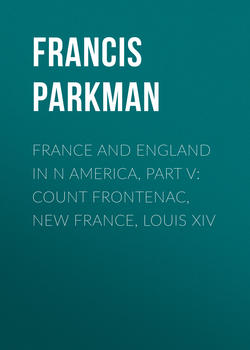France and England in N America, Part V: Count Frontenac, New France, Louis XIV

Реклама. ООО «ЛитРес», ИНН: 7719571260.
Оглавление
Francis Parkman. France and England in N America, Part V: Count Frontenac, New France, Louis XIV
PREFACE
CHAPTER I
CHAPTER II
CHAPTER III
CHAPTER IV
CHAPTER V
CHAPTER VI
CHAPTER VII
CHAPTER VIII
CHAPTER IX
CHAPTER X
CHAPTER XI
CHAPTER XII
CHAPTER XIII
CHAPTER XIV
CHAPTER XV
CHAPTER XVI
CHAPTER XVII
CHAPTER XVIII
CHAPTER XIX
CHAPTER XX
CHAPTER XXI
APPENDIX
Отрывок из книги
At Versailles there is the portrait of a lady, beautiful and young. She is painted as Minerva, a plumed helmet on her head, and a shield on her arm. In a corner of the canvas is written Anne de La Grange-Trianon, Comtesse de Frontenac. This blooming goddess was the wife of the future governor of Canada.
Madame de Frontenac, at the age of about twenty, was a favorite companion of Mademoiselle de Montpensier, the grand-daughter of Henry IV. and daughter of the weak and dastardly Gaston, Duke of Orleans. Nothing in French annals has found more readers than the story of the exploit of this spirited princess at Orleans during the civil war of the Fronde. Her cousin Condé, chief of the revolt, had found favor in her eyes; and she had espoused his cause against her cousin, the king. The royal army threatened Orleans. The duke, her father, dared not leave Paris; but he consented that his daughter should go in his place to hold the city for Condé and the Fronde.
.....
In his charges of cabal and intrigue, Frontenac had chiefly in view the clergy, whom he profoundly distrusted, excepting always the Récollet friars, whom he befriended because the bishop and the Jesuits opposed them. The priests on their part declare that he persecuted them, compelled them to take passports like laymen when travelling about the colony, and even intercepted their letters. These accusations and many others were carried to the king and the minister by the Abbé d'Urfé, who sailed in the same ship with Fénelon. The moment was singularly auspicious to him. His cousin, the Marquise d'Allègre, was on the point of marrying Seignelay, the son of the minister Colbert, who, therefore, was naturally inclined to listen with favor to him and to Fénelon, his relative. Again, Talon, uncle of Perrot's wife, held a post at court, which brought him into close personal relations with the king. Nor were these the only influences adverse to Frontenac and propitious to his enemies. Yet his enemies were disappointed. The letters written to him both by Colbert and by the king are admirable for calmness and dignity. The following is from that of the king:—
"Though I do not credit all that has been told me concerning various little annoyances which you cause to the ecclesiastics, I nevertheless think it necessary to inform you of it, in order that, if true, you may correct yourself in this particular, giving to all the clergy entire liberty to go and come throughout all Canada without compelling them to take out passports, and at the same time leaving them perfect freedom as regards their letters. I have seen and carefully examined all that you have sent touching M. Perrot; and, after having also seen all the papers given by him in his defence, I have condemned his action in imprisoning an officer of your guard. To punish him, I have had him placed for a short time in the Bastile, that he may learn to be more circumspect in the discharge of his duty, and that his example may serve as a warning to others. But after having thus vindicated my authority, which has been violated in your person, I will say, in order that you may fully understand my views, that you should not without absolute necessity cause your commands to be executed within the limits of a local government, like that of Montreal, without first informing its governor, and also that the ten months of imprisonment which you have made him undergo seems to me sufficient for his fault. I therefore sent him to the Bastile merely as a public reparation for having violated my authority. After keeping him there a few days, I shall send him back to his government, ordering him first to see you and make apology to you for all that has passed; after which I desire that you retain no resentment against him, and that you treat him in accordance with the powers that I have given him." 29
.....